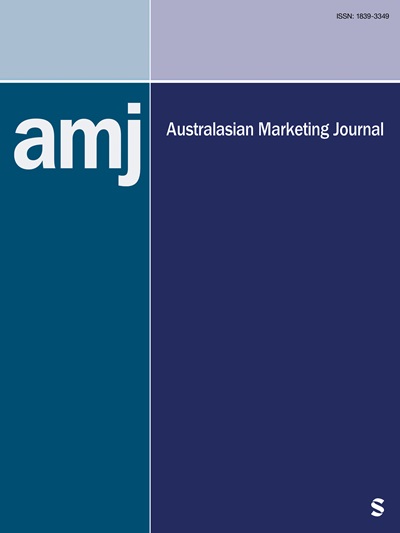走向营销复兴:挑战潜在的假设
IF 3.8
Q2 BUSINESS
引用次数: 3
摘要
市场营销通常被认为处于危机之中,失去了信誉,需要改革。在众多试图解决其困境的尝试中,有一个问题似乎没有被问到:是否存在过时的潜在基本假设,阻碍了营销的重新发明,以适应新兴的商业和社会挑战?本文表明,市场营销是由几个潜在的基本假设所引导的,所有这些假设都是隐含的。对活动的主要关注,而不是对营销应该作为一种现象的讨论,将营销牢牢地束缚在传统的控制中。为了使营销作为一种现象的表述,本文仔细审查了这些隐含的假设,并提出了一套替代的基本假设。使公司或其他机构对其客户或其他利益相关者有意义,目的是创造吸引力,被认为是一种营销现象。最后,它证明了营销作为有意义的重要和深远的影响,提供了发展和改革营销的机会,使其在新兴的商业和社会环境中更具相关性和包容性。本文章由计算机程序翻译,如有差异,请以英文原文为准。
Towards a Marketing Renaissance: Challenging Underlying Assumptions
Marketing is commonly considered to be in crisis, losing credibility and in need of reform. Among the many attempts to solve its predicament, one question seems not to be asked: Could there be underlying foundational assumptions that are outdated, and which hinder marketing from being re-invented to fit emergent business and societal challenges? This article demonstrates that marketing is steered by several underlying foundational assumptions, all of which have remained implicit. A dominating focus on activities, as opposed to a discussion of what marketing should be as a phenomenon, constrains marketing in the steadfast grip of tradition. To enable a formulation of marketing as a phenomenon, this paper scrutinises these implicit assumptions and proposes an alternative set of foundational assumptions. Making firms or other institutions meaningful to their customers or other stakeholders with the aim of creating attraction is suggested as a marketing phenomenon. Finally, it is demonstrated that marketing as meaningfulness has important and far-reaching consequences, providing opportunities to develop and reform marketing to make it more relevant and inclusive in the emergent business and societal environment.
求助全文
通过发布文献求助,成功后即可免费获取论文全文。
去求助
来源期刊

Australasian Marketing Journal
BUSINESS-
CiteScore
14.90
自引率
16.70%
发文量
25
期刊介绍:
The Australasian Marketing Journal (AMJ) is the official journal of the Australian and New Zealand Marketing Academy (ANZMAC). It is an academic journal for the dissemination of leading studies in marketing, for researchers, students, educators, scholars, and practitioners. The objective of the AMJ is to publish articles that enrich and contribute to the advancement of the discipline and the practice of marketing. Therefore, manuscripts accepted for publication will be theoretically sound, offer significant research findings and insights, and suggest meaningful implications and recommendations. Articles reporting original empirical research should include defensible methodology and findings consistent with rigorous academic standards.
 求助内容:
求助内容: 应助结果提醒方式:
应助结果提醒方式:


